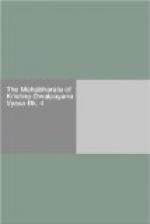[42] This sloka does not occur in every text. This is a typical illustration of the round about way, frequently adopted by Sanskrit writers, of expressing a simple truth. The excuse in the present instance consists in Drona’s unwillingness to identify the solitary hero with Arjuna, in the midst of all his hearers. Nadiji is an exclamation referring to Bhishma, the son of the river Ganga. Lankesa-vanari-ketu is simply ‘ape-bannered,’ or as rendered in the text, having the devastator of the gardens of Lanka’s lord for the sign of his banner. Nagahvaya is ‘named after tree’ for Arjuna is the name of an Indian tree. Nagri-sunu is ’Indra’s son’,—Indra being the foe of mountain, for formerly it was he who cut off the wings of all mountains and compelled them to be stationary. He failed only in the case of Mainaka, the son of Himavat.
Vaisampayana continued, “The son of Dhritarashtra, O chastiser of foes, having said this, Bhishma and Drona and Kripa and Drona’s son all applauded his manliness!”
SECTION XL
Vaisampayana said, “Having reached that Sami tree, and having ascertained Virata’s son to be exceedingly delicate and inexperienced in battle, Partha addressed him, saying, ’Enjoined by me, O Uttara, quickly take down (from this tree) some bows that are there. For these bows of thine are unable to bear my strength, my heavy weight when I shall grind down horses and elephants, and the stretch of my arms when I seek to vanquish the foe. Therefore, O Bhuminjaya, climb thou up this tree of thick foliage, for in this tree are tied the bows and arrows and banners and excellent coats of mail of the heroic sons of Pandu, viz., Yudhishthira and Bhima and Vibhatsu and the twins. There also is that bow of great energy, the Gandiva of Arjuna, which singly is equal to many thousands of other bows and which is capable of extending the limits of a kingdom. Large like a palmyra tree, able to bear the greatest stress, the largest of all weapons, capable of obstructing the foe, handsome, and smooth, and broad, without a knot, and adorned with gold, it is stiff and beautiful in make and beareth the heaviest weight. And the other bows also that are there, of Yudhishthira and Bhima and Vibhatsu and the twins, are equally mighty and tough.’”
SECTION XLI
“Uttara said, ’It hath been heard by us that a corpse is tied in this tree. How can I, therefore, being a prince by birth, touch it with my hands? Born in the Kshatriya order, and the son of a great king, and always observant of mantras and vows, it is not becoming of me to touch it. Why shouldst thou, O Vrihannala, make me a polluted and unclean bearer of corpses, by compelling me to come in contact with a corpse?’
“Vrihannala said, ’Thou shalt, O king of kings, remain clean and unpolluted. Do not fear, there are only bows in this tree and not corpses. Heir to the king of the Matsyas, and born in a noble family, why should I, O prince, make thee do such a reproachable deed?’”




